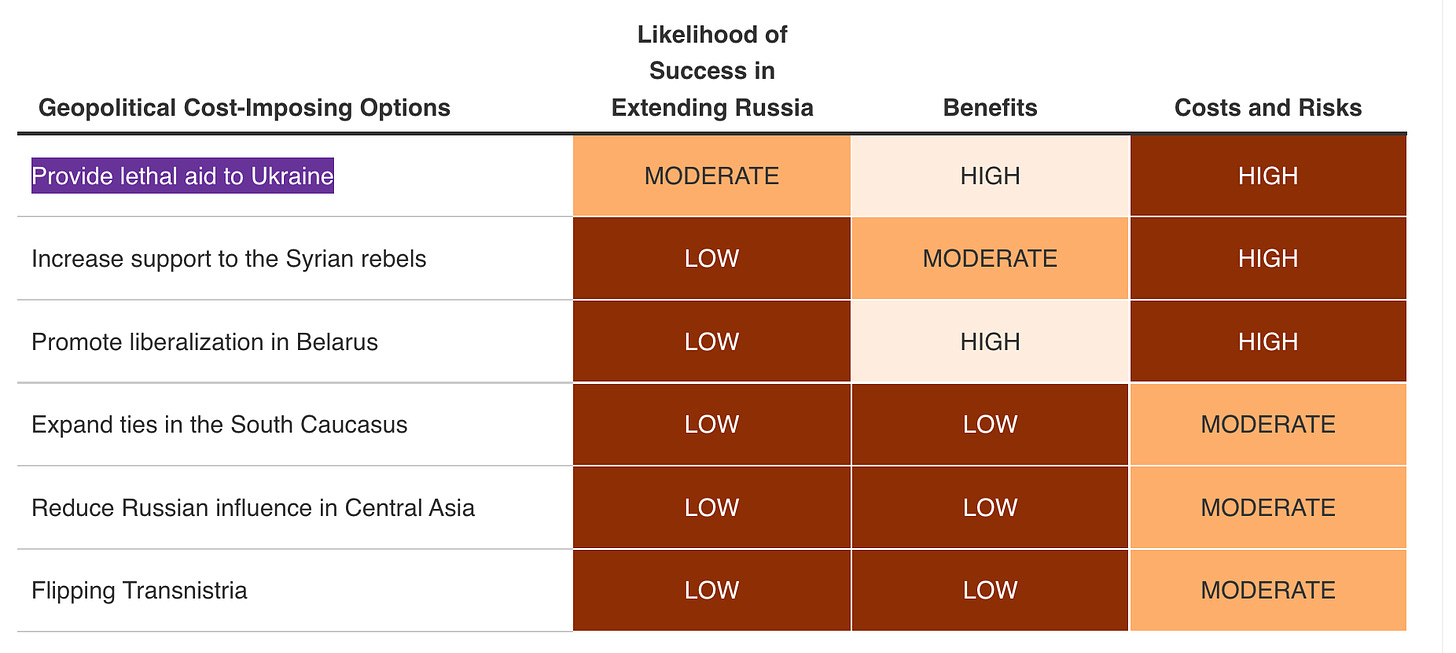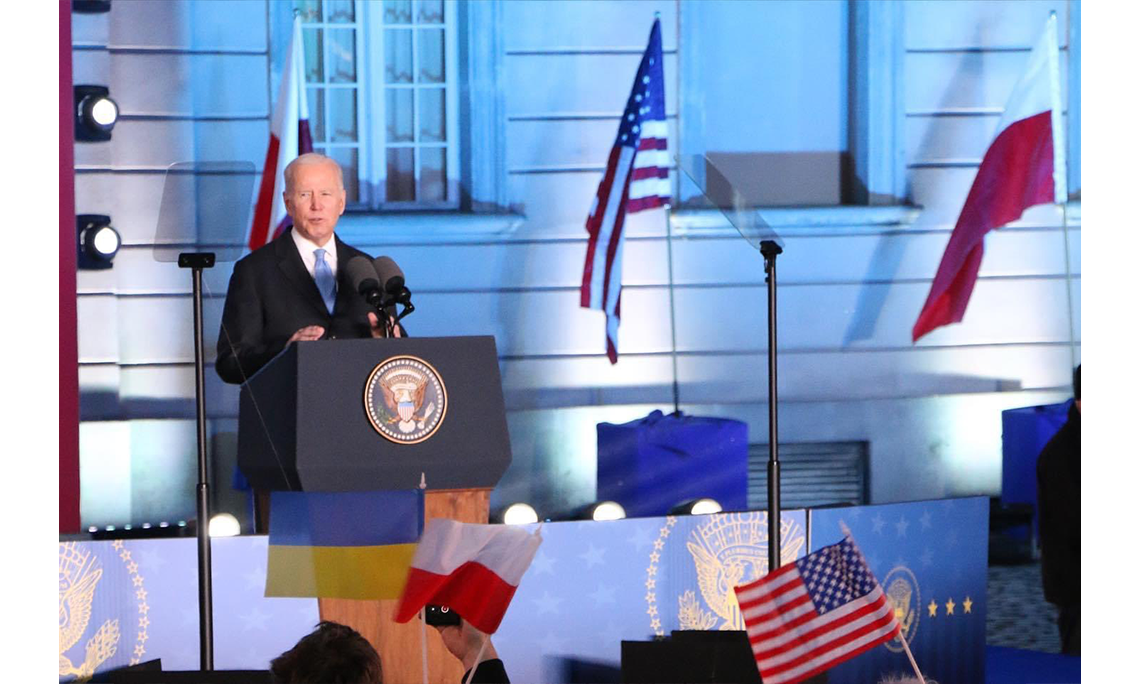Urging regime change in Russia, Biden exposes US aims in Ukraine
Biden's declaration that Putin "cannot remain in power" was not an error, but a clear expression of entrenched US policy: using Ukraine for a proxy war against Russia.
"Laying the groundwork for regime change in Russia"
President Biden's declaration in Warsaw that Vladimir Putin "cannot remain in power" has forced the White House into damage control, insisting that he was not calling for the Russian leader's ouster.
No amount of spin can obscure the obvious: Just like when he blurted out the truththat the US and its allies supported an Al Qaeda-dominated insurgency in Syria, Biden has laid bare the United States government's longstanding regime change aims in Russia, with Ukraine used as the tip of the spear.
Months before the US-backed Maidan coup that ousted Ukrainian President Viktor Yanukovych in February 2014, the head of the National Endowment for Democracy, a US intelligence cutout, dubbed Ukraine "the biggest prize" in the new Cold War with Russia. Pulling Ukraine into the Western orbit, Carl Gershman wrote, could leave Putin "on the losing end not just in the near abroad but within Russia itself."
The message was heard within Russia. "The Kremlin is convinced the United States is laying the groundwork for regime change in Russia, a conviction further reinforced by the events in Ukraine," the Defense Intelligence Agency reported in 2017. "Moscow views the United States as the critical driver behind the crisis in Ukraine and believes that the overthrow of former Ukrainian President Yanukovych is the latest move in a long-established pattern of U.S.-orchestrated regime change efforts, including the Kosovo campaign, Iraq, Libya, and the 2003–05 'color revolutions' in Georgia, Ukraine, and Kyrgyzstan."
The "events in Ukraine" that "reinforced" the Kremlin's perception included not just the 2014 coup but the proxy war that erupted in the eastern Donbas region as a result. Unwilling to live under a US-backed far-right government that banned the Russian language, venerated Nazis, and committed atrocities like the Odessa massacre, rebels in Donetsk and Luhansk took up arms in the spring of 2014 with Russia's support. The Ukrainian government responded with an "Anti-Terrorist Operation" backed by US weapons and military trainers.
When it became undeniable that US-backed shock troops for the Ukrainian counteroffensive included the "openly neo-Nazi" Azov battalion, President Obama began getting cold feet. Obama worried that sending more arms to a Nazi-infested military "would only escalate the bloodshed," in Ukraine and possibly "[end] up in the hands of thugs," the New York Times reported in 2015.
Inside the White House, Obama was virtually alone. His concern that flooding Ukraine with weapons "would escalate the crisis" and give "Putin a pretext to go further and invade all of Ukraine," Senior Pentagon official Derek Chollet later recalled, marked a rare situation "in which just about every senior official was for doing something that the president opposed."
Obama's misgivings about arming Ukraine helped yield the 2015 Minsk II accords, in which an outmatched Kiev accepted limited autonomy for the Donbas in exchange for the Russian-backed rebels' demilitarization. While this bargain would end the war, it would also grant the Donbas region an effective veto over Ukraine's NATO ambitions. The Ukrainian far-right, empowered by the 2014 Maidan coup and in no mood for an accommodation with Russian-speakers in the east, successfully undermined the Minsk accords with violent protests.
With Obama's exit from the White House, the DC foreign policy establishment — also opposed to an accommodation with Russia — seized the opportunity to permanently sabotage Minsk and escalate the Ukraine proxy war that the outgoing president had tepidly waged. Their goal was made clear by two of the Senate's leading hawks, Republican Senators John McCain and Lindsay Graham, during a visit to Ukraine in December 2016.
"Your fight is our fight. 2017 will be the year of offense," Graham declared to a group of Ukrainian soldiers at a military base. "All of us will go back to Washington and we will push the case against Russia… It is time for them to pay a heavier price."
"We are with you, your fight is our fight and we will win together," McCain told Ukrainian state media. "In 2017 we will defeat the invaders and send them back where they came from."
When Donald Trump took office weeks later, Washington neoconservatives capitalized on Russiagate mania to achieve their desired "year of offense." Heavy bipartisan lobbying, coupled with his own incentive to disprove the frenzied allegations that he was beholden to the Kremlin, swayed Trump to reverse the Obama policy and approve the sale of Javelin anti-tank missiles to Ukraine.
In the Donbas, the heaviest price was paid by residents living under Ukrainian military shelling, who, according to UN figures, have accounted for 81% of the civilian casualties since 2018.
Although billed by proxy war champions like McCain as a fight against Russian "invaders", the US has long known that the rebels are in fact a local insurgency. In the Donbas, "Ukraine has mainly not been fighting Russia’s armed forces," two senior analysts with the Pentagon-tied RAND corporation recently observed. Instead, "the vast majority of rebel forces consist of locals—not soldiers of the regular Russian military." Up until the invasion last month, the Russian military "never used more than a tiny fraction of its capabilities against the Ukrainians."
A 2019 study by the same think tank offers strong evidence that turning Russia into "invaders" -- rather than just expending a "tiny fraction" of its military power to support the rebels -- has been the US goal.
The RAND study, "Overextending and Unbalancing Russia," found that arming Ukraine stands the highest chance of success of "exploit[ing] Russia’s greatest point of external vulnerability."

"Expanding U.S. assistance to Ukraine, including lethal military assistance, would likely increase the costs to Russia, in both blood and treasure, of holding the Donbass region," the study said. "…The Ukrainian military already is bleeding Russia in the Donbass region (and vice versa). Providing more U.S. military equipment and advice could lead Russia to increase its direct involvement in the conflict and the price it pays for it. Russia might respond by mounting a new offensive and seizing more Ukrainian territory."
According to the RAND authors, Lieutenant General Ben Hodges, the former general of U.S. Army Europe, "argued against giving Javelin anti-tank missiles to Ukraine for precisely this reason."
While serving in Obama's State Department, the current Secretary of State, Antony Blinken, publicly advocated the same position. "If you’re playing on the military terrain in Ukraine, you’re playing to Russia’s strength, because Russia is right next door," Blinken told a Berlin audience in March 2015. "It has a huge amount of military equipment and military force right on the border. Anything we did as countries in terms of military support for Ukraine is likely to be matched and then doubled and tripled and quadrupled by Russia."

Since taking office as Biden's Secretary of State, Blinken and his colleagues have adopted the reverse position, flooding Ukraine with weapons and undermining diplomatic opportunities that could have avoided war.
https://mate.substack.com/p/urging-regime-change-in-russia-biden?s=w






Geen opmerkingen:
Een reactie posten